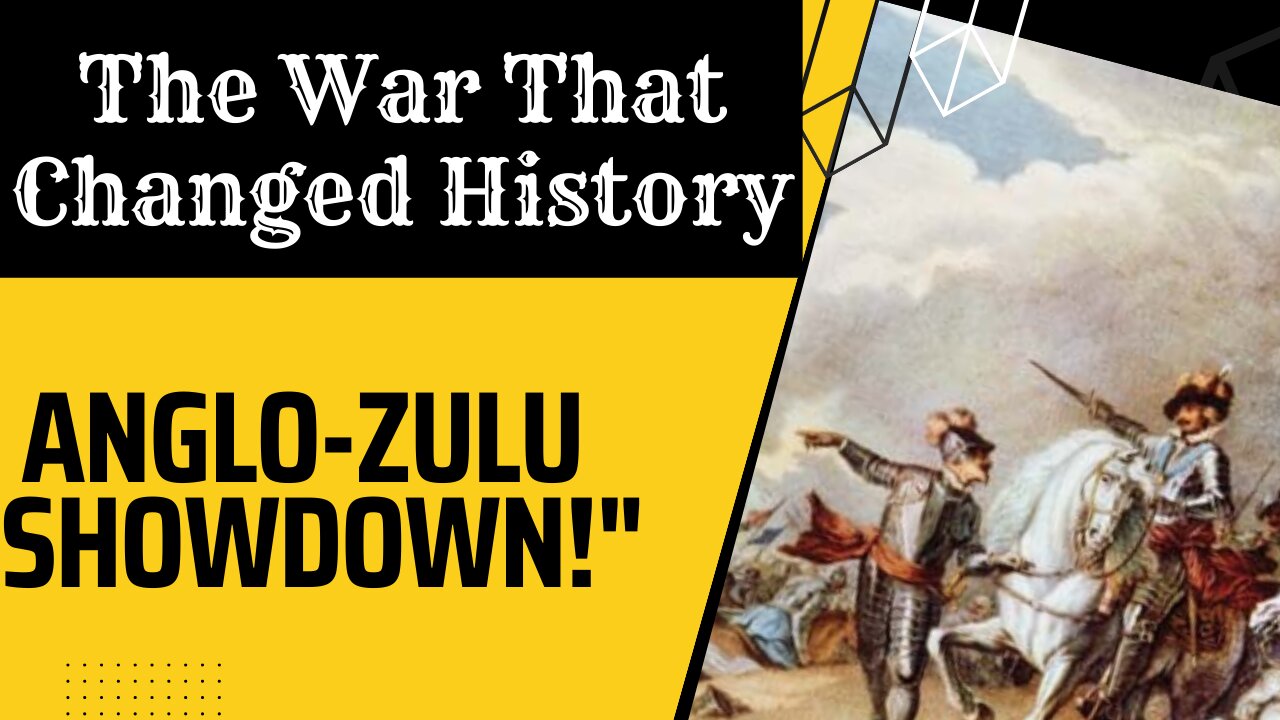Premium Only Content

Epic Battles Uncovered: The Anglo-Zulu War – Secrets, Strategies, and Heroes!"
The Anglo-Zulu War of 1879 was a conflict between the British Empire and the Zulu Kingdom in southern Africa. The war was fought over British territorial expansion, and it resulted in a decisive Zulu victory at the Battle of Isandlwana, followed by a British victory at the Battle of Ulundi. The war had a significant impact on the history of southern Africa, and it is still studied and debated to this day. In this article, we will answer the top 18 questions about the Anglo-Zulu War.
What caused the Anglo-Zulu War?
The main cause of the war was British territorial expansion into Zulu territory, which was seen as a threat to Zulu sovereignty and independence.
Who was involved in the war?
The war was fought between the British Empire and the Zulu Kingdom, with additional support from several African tribes and European mercenaries on both sides.
When did the war take place?
The war took place from January to July 1879.
Where did the war take place?
The war was fought in the region of modern-day South Africa, primarily in the Zulu Kingdom.
Who were the key leaders on each side?
The British were led by Lord Chelmsford, while the Zulus were led by King Cetshwayo.
What was the outcome of the war?
The war resulted in a decisive Zulu victory at the Battle of Isandlwana, followed by a British victory at the Battle of Ulundi. The Zulu Kingdom was ultimately defeated, and Zulu independence was severely curtailed.
How many casualties were there in the war?
The exact number of casualties is unknown, but it is estimated that there were around 1,700 British casualties and 3,000 Zulu casualties.
What weapons were used in the war?
The British used modern rifles and artillery, while the Zulus primarily used traditional weapons such as spears and shields.
What was the significance of the Battle of Isandlwana?
The Battle of Isandlwana was a significant Zulu victory over the British, and it remains one of the most famous battles in African military history.
What was the significance of the Battle of Ulundi?
The Battle of Ulundi was the final battle of the war and resulted in a decisive British victory, which effectively ended the Zulu Kingdom's independence.
What impact did the war have on British colonial policy?
The war had a significant impact on British colonial policy, as it highlighted the need for improved military tactics and equipment in colonial conflicts.
What impact did the war have on the Zulu people?
The war had a devastating impact on the Zulu people, as it resulted in the loss of their independence and the imposition of British colonial rule.
. What role did European mercenaries play in the war?
European mercenaries played a significant role in the war, as they provided military expertise and firepower to both sides.
Was the war a justifiable conflict?
The justifiability of the war is a matter of debate, with some arguing that it was necessary for British territorial expansion and others arguing that it was a colonialist aggression against a sovereign African nation.
What lessons can be learned from the war?
The war highlighted the importance of understanding local cultures and military tactics in colonial conflicts, and it also demonstrated the need for improved communication and coordination among colonial forces.
How is the war remembered today?
The war is remembered as a significant event in the history of southern Africa, and it is still studied and debated by historians and military strategists.
Did the war have any lasting impacts on the region?
The war had significant lasting impacts on the region, including the imposition of British colonial rule and the disruption of traditional Zulu society.
How did the war contribute to the larger context of colonialism in Africa?
The war was a significant example of European colonialism in Africa, and it contributed to the larger pattern of European aggression and exploitation on the continent.
The Anglo-Zulu War of 1879 was a complex conflict with significant impacts on the history of southern Africa. The war highlighted the importance of understanding local cultures and military tactics in colonial conflicts, and it also demonstrated the devastating consequences of European colonialism on African societies. Today, the war is remembered as a significant event in the region's history, and it continues to be studied and debated by historians and military strategists alike.
-
 1:04:52
1:04:52
Geeks + Gamers
3 hours agoDisney RATIO'D on Christmas Day | Mufasa Embarrassed By Sonic 3
13.8K1 -
 LIVE
LIVE
Sm0k3m
7 hours agoPlaying games on Rumble
223 watching -
 10:37
10:37
Russell Brand
2 days agoHow is this even allowed?
121K732 -
 1:37:26
1:37:26
Real Coffee With Scott Adams
3 hours agoEpisode 2701 CWSA 12/26/24
60.6K47 -
 2:58:58
2:58:58
Wendy Bell Radio
8 hours ago9 Steps Ahead
80K120 -
 2:03:46
2:03:46
LFA TV
17 hours agoTIME FOR A NEW SPEAKER! | LIVE FROM AMERICA 12.26.24 11am EST
49.3K30 -
 1:40:22
1:40:22
Game On!
14 hours ago $4.74 earnedNFL Thursday Night Football Seahawks at Bears EXPERT Picks!
33.3K9 -
 1:50:54
1:50:54
xBuRnTx
3 hours agoWho's Ready for New Years!
29.2K1 -
 12:09
12:09
Tactical Advisor
16 hours agoSmith & Wesson Shield Plus Carry Comp
19.3K1 -
 4:35:25
4:35:25
Father Russell
9 hours agoDelta Force | Not A Woman? | Mad Martigan Time
64.7K5